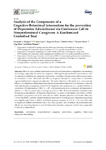Analysis of the Components of a Cognitive-Behavioral Intervention for the prevention of Depression Administered via Conference Call to Nonprofessional Caregivers: A Randomized Controlled Trial

Use este enlace para citar
http://hdl.handle.net/2183/25352
A non ser que se indique outra cousa, a licenza do ítem descríbese como Atribución 4.0 Internacional
Coleccións
- UI- UIPSAL - Artigos [30]
Metadatos
Mostrar o rexistro completo do ítemTítulo
Analysis of the Components of a Cognitive-Behavioral Intervention for the prevention of Depression Administered via Conference Call to Nonprofessional Caregivers: A Randomized Controlled TrialAutor(es)
Data
2020Cita bibliográfica
Vázquez, F.L.; López, L.; Torres, Á.J.; Otero, P.; Blanco, V.; Díaz, O.; Páramo, M. Analysis of the Components of a Cognitive-Behavioral Intervention for the prevention of Depression Administered via Conference Call to Nonprofessional Caregivers: A Randomized Controlled Trial. Int. J. Environ. Res. Public Health 2020, 17, 2067. https://doi.org/10.3390/ijerph17062067
Resumo
[Abstract] Effective and accessible interventions for indicated prevention of depression are necessary and lacking, especially for informal caregivers. Although telephone-based interventions could increase the accessibility for caregivers, randomized controlled trials are scarce, with no examination of prevention to date. Moreover, the efficacy of specific therapeutic components in preventive cognitive-behavioral programs is unknown. The main objective of this study was to evaluate the efficacy of a telephone-administered psychological preventive intervention in informal caregivers with high depressive symptoms. A total of 219 caregivers were randomized to a cognitive-behavioral conference call intervention (CBCC, n = 69), a behavioral-activation conference call intervention (BACC, n = 70), or a usual care control group (CG, n = 80). Both interventions consisted of five 90-minute group sessions. At the post-intervention, incidence of depression was lower in CBCC and BACC compared to CG (1.5% and 1.4% vs. 8.8%). Relative risk was 0.17 for the CBCC and 0.16 for the BACC, and the number-needed-to-treat was 14 in both groups. Depressive symptoms were significantly lower in BACC and BACC groups compared to CG (d = 1.16 and 1.29), with no significant differences between CBCC and BACC groups. The conference call intervention was effective in preventing depression and the behavioral-activation component (BACC) was comparable to the CBCC intervention.
Palabras chave
Depression
Nonprofessional caregiver
Prevention
Cognitive
Behavioral
Telephone
Dismantling
Nonprofessional caregiver
Prevention
Cognitive
Behavioral
Telephone
Dismantling
Versión do editor
Dereitos
Atribución 4.0 Internacional






